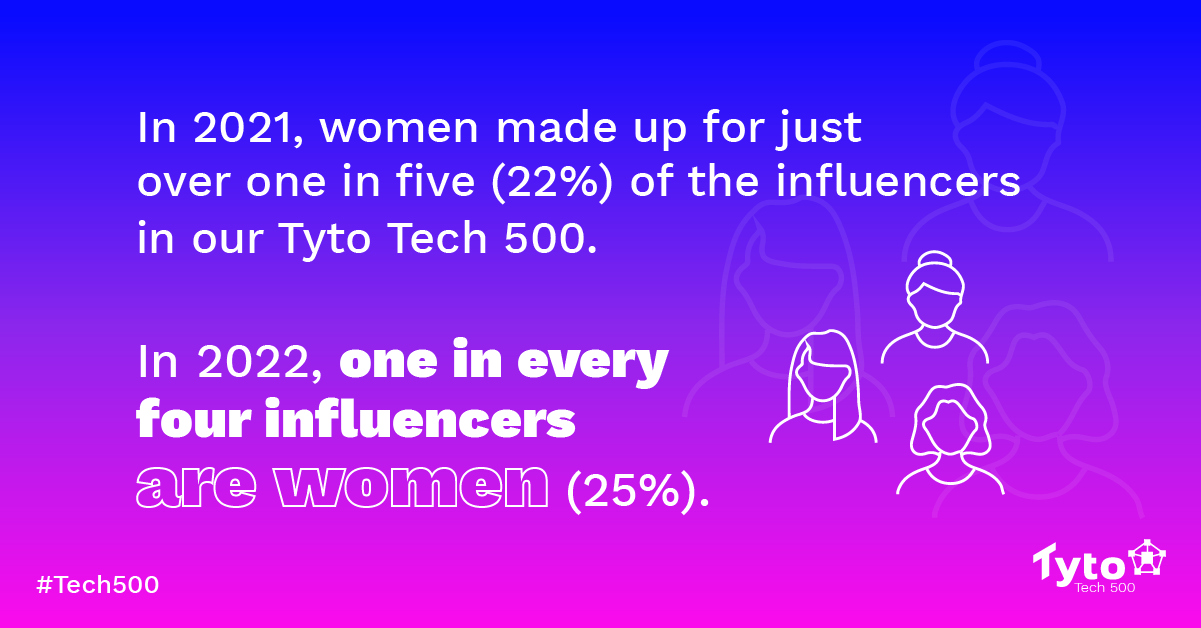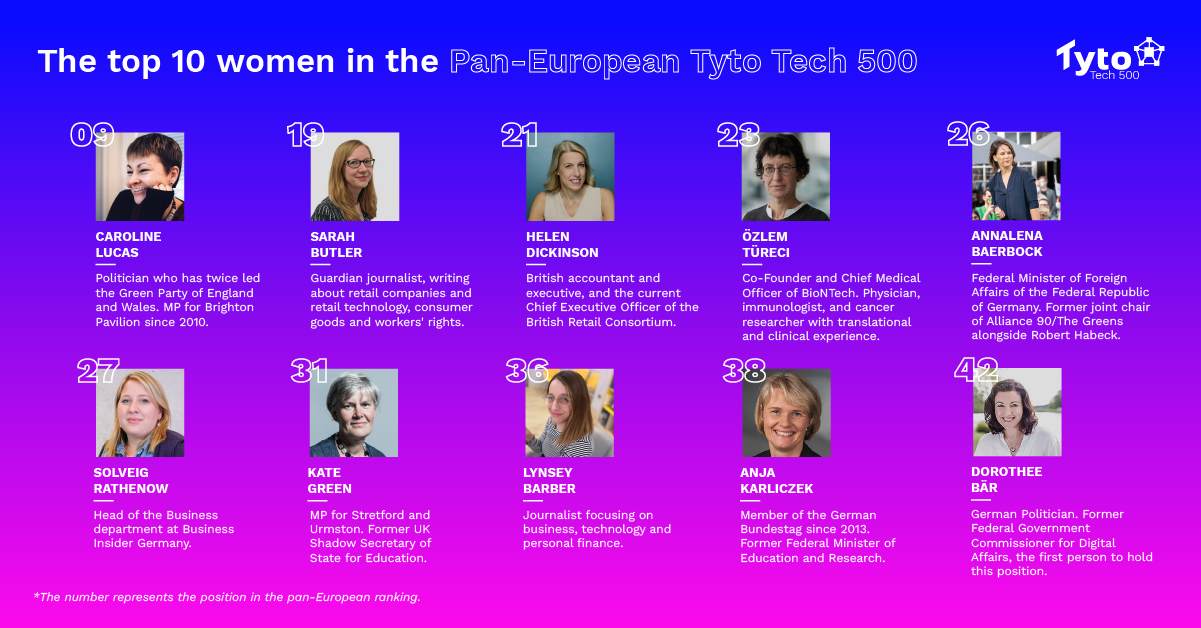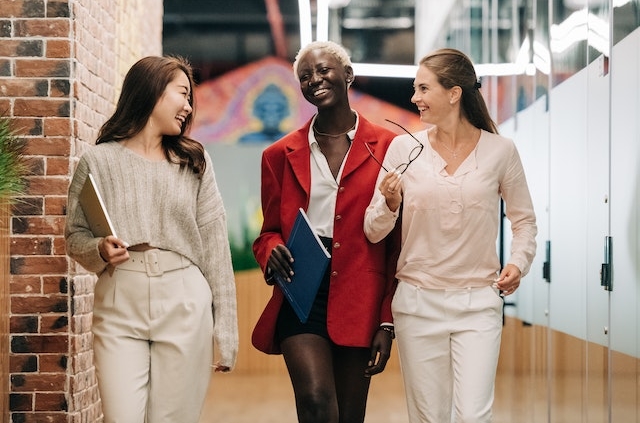Breaking down barriers: The rise of women in European Tech
The lack of women in technology is not an easy problem to solve. Despite recent research from the Tech Talent Charter indicating that women and gender minorities now make up a larger proportion of the UK’s tech workforce than ever before, this figure is still just 28%, and moving slowly, albeit in the right direction. Greater gender diversity matters for many reasons – firstly, to address a shortage of tech talent employers must hire from a more diverse candidate pool, but ultimately women are needed to help ensure that technological innovation accounts for everyone and that technology isn’t biased towards men.
Research has found that women are more likely to be attracted to tech roles if they have strong role models and can see women represented at senior levels within the organisations they work for. So, it is encouraging to see the presence of women increasing in the Tyto Tech 500 report, our proprietary research and data-driven ranking of the most influential individuals in technology in the UK, Germany and France.
Here, women are still in the minority, however, the number of women among the Tyto Tech 500 influencers at a pan-European level has increased and progress looks promising. The report, which we launched last November shows that in 2021 women made up for just over one in five tech influencers (22%), while in 2022 one in every four influencers are women (25%). There are 126 women among the top 500 tech influencers across the UK, Germany and France.

If we look at each of these countries individually, we see that the UK leads the way in gender diversity with 26% of influencers on its country list identifying as women (132 out of 500). Germany comes in a close second with 25% of women in its country list (127 women in the German ranking). France comes last: only 20% of its influencers are women, with a total of 98 women among the top 500 tech personalities in France.
After analysing this year’s Tyto Tech 500 data, it feels important to mention that the relevance of women in top positions in tech has increased in all countries, leading to a more diverse representation in the tech sector. 24% of French influencers in the pan-European top 500 –the 500 most influential personalities in tech across the three countries combined- are women (last year it was only 11.1%). Germany has risen from 19% to 23% women in the pan-European top 500. The UK remains the country with the most women (74), it also has the highest percentage of women versus men among the total number of influencers in the pan-European top 500 across the three countries: 27% compared to 24% last year.
Leading the way forward: Women influencers in Business and Government
In the 2022 Tyto Tech 500 report, the majority of the most influential women in tech are business leaders (43%) or journalists (33%). However, at the top of the ranking are top-level government figures. 50% of the top 10 women in technology are from the Government category, and there are 11 in total working in governmental roles, representing 9% of the women in the top 500. The Academic group ties with Government in third place by type of influencers in our ranking, also with 9% of all women in the top 500. Nonetheless, there is a significant difference among the countries: in France the share of academic influencers rises to almost one in four women (24%), in Germany it is way above the pan-European average (14%), but the UK has just 3% of all the women in the pan-European top 500 from the academic sector.
The technology sectors with the highest presence of women in the pan-European top 500 among the 17 sectors analysed are FinTech and RetailTech (each with 7% of all women in this ranking), only behind General tech (41%).
There are several well-known women in the public sphere of the tech industry identified in our pan-European top 500. Among them are Caroline Lucas, Green MP for Brighton Pavilion, former leader of The Green Party and influential in the GreenTech sector; Sarah Butler, The Guardian journalist, covering retail companies and retail technology, consumer goods and workers’ rights; Helen Dickinson, current Chief Executive Officer of the British Retail Consortium; Annalena Baerbock, also an influencer of the GreenTech category, a German politician of the Alliance 90/The Greens party serving as Germany’s minister for foreign affairs since 2021; and Solveig Rathenow, a journalist that heads the German Business Insider’s business department.

While the representation of women in tech has been moving in the right direction, progress has been slow and needs much improvement. We have been working with the Tech Talent Charter (TTC) a non-profit that seeks to drive inclusion and diversity in the UK technology sector, as a pro bono client since 2019. They provide concrete measurement and insights into diversity in the tech ecosystem and actionable ways forward by gathering, curating, and distributing innovative practices, techniques, and ideas.
Their latest Diversity in Tech report, indicates that gender minorities occupy 22% of senior tech positions, which is 6% less than the percentage of gender minorities in tech roles in general. The Charter also highlights the significant decrease in ethnic diversity in senior roles, with the percentage dropping from 25% to 13%.
I am proud to have been able to participate in TTC’s in:tech podcast series as a host, with high-profile guests who are leaders in the DE&I and tech space, and to have listened to their practical insights and takeaways that can help any business move the dial towards DE&I efforts. And I hope that by recognising the inspiring and influential women in tech across Europe in the Tyto Tech 500 we can help to increase awareness of these role models and inspire even more women to achieve great things in tech.
If you want to keep track of these and other advances made by women in the technology sector and get to know the biggest tech influencers in the UK, Germany and France, download the full 2022 Tyto Tech 500 report here.
Featured image by Alexander Suhorucov.











